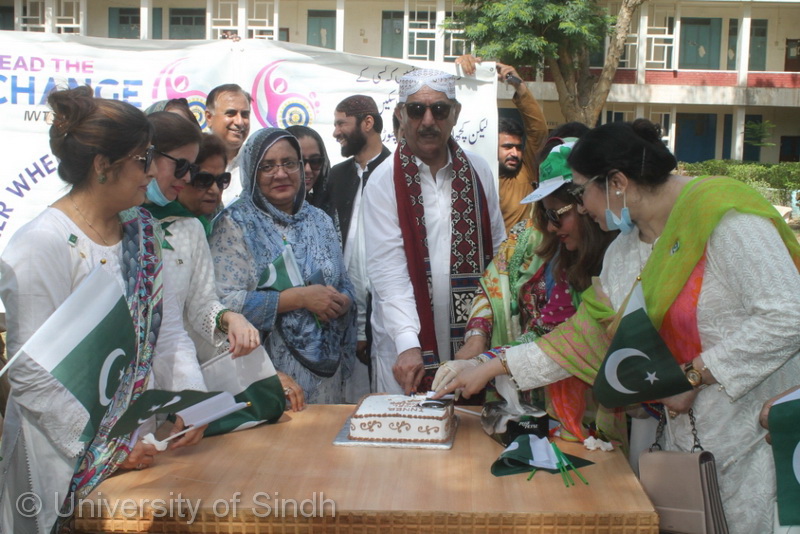
Speakers call Pakistan ‘a land of opportunity and promise’ in a webinar held at SU to mark the country’s 73rd Independence Day preceded by an elegant array of activities
Pakistan is the only country in the world that is a gateway to the Middle East, Central Asia, China, and rest of South Asia. Pakistan is the only Muslim country that is a Nuclear Power. Pakistan is one of the few countries in the world where you will see almost all kinds of landscapes, weather-patterns, rich resources, the sea, the rivers, the mountain terrains, forests, lakes, rich culture and hardworking masses. It is a land that abounds in opportunity and promise.
This was the upshot of what the speakers said in a webinar on the theme “Emergence of Pakistan as a Nation State: Contextualizing Global Challenges and Opportunities” organized by Pakistan Study Centre, University of Sindh, Jamshoro in collaboration with Paigham-e-Pakistan to mark 73rd Independence Day of Pakistan. The webinar was presided over by SU Vice Chancellor Prof. Dr. Fateh Muhammad Burfat, Member National Assembly of Pakistan Dr. Shazia Sobia Aslam Soomro was the Chief Guest; whereas Ex-Dean Faculty of Social Sciences University of the Punjab Prof. Dr. Muhammad Iqbal Chawla, Professor of Politics and International Relations International Islamic University Islamabad Brigadier (R) Dr. Muhammad Khan and Development Consultant Media Practitioner Educationist Dr. Shoaib Ahmed were the Guest Speakers. Director SU Pakistan Study Centre Prof. Dr. Shuja Ahmed Mahesar was the host and moderator of the event.
Dr. Burfat, in his presidential address, said that socio-economic development was inevitable for the prosperity and stability of Pakistan. We, as a nation-state face challenges of illiteracy, poverty, ignorance, intolerance, lack of internal cohesiveness, sectarian disharmony, extremism, and terrorism. As for opportunities, we have the biggest youth-bulge available, which if channelized appropriately can turn into startling labor force machinery that would be the world’s envy.
“We need to build Pakistan into a dynamic economy with modernized agriculture, industry, sound education- base and advancement in science and technology”, the VC said.
The Vice Chancellor extolled the efforts of Dr. Mehmood-ul-Hassan Mughal, Dr. Sumera Umrani, Ms. Jabeen Bhutto, Ms. Mukhtiar Bhatti, and Ajved Ahmed Bhatti towards brilliant event ceremonies.
MNA Dr. Sazia Aslam said she was glad to note improved energy, environment, digital, technological, security, youth mobilization, women empowerment, and mass awareness profile in Pakistan in the recent-most times.
“However, areas including child-labor, delivery service, institutional performance, greater prevalence of tolerant political culture, respect and space for the difference of opinion, pluralism, and promotion of core human values needed attention and interventions”, Dr. Soomro emphasized.
Dr. Chawla said they needed to re-shape their policy framework in accordance with the demands of globalization while ensuring that the ideological bearings of the country remained firmly rooted to the teachings and golden principles of Islam.
“We should take advantage of our strategic location at the crossroads of South Asia, Central Asia, and West Asia. Geography has endowed us with the unique potential to become the hub of economic activity in our region” Dr. Chawla stressed.
Brigadier (R) Dr. Khan said they, as a nation-state should spotlight on the economic integration of the various sub-regions of Asia, adding that they could play an effective role in paving the way for an era of shared prosperity for all regions and all societies in Asia and beyond.
He added that Pakistan pursues pleasant paradigms of peace and development by developing cordial relations with all countries at the international front.
“Pakistan’s strategic partnership with China has been an important factor of peace and stability in the region. Our close fraternal cooperation with the Islamic world is deeply rooted in bonds of common culture and faith”, Dr. Khan observed.
Dr. Shoaib Ahmed said ensuring equal distribution of wealth, dispensation Of free and quick justice, curb corruption at all levels, reviewing curriculum, improving health care system, provision of equal and equitable rights and opportunities to all citizens, initiation of poverty alleviation programs, controlling population growth and industrial development were some major means to enable potential and resource-rich country like Pakistan to quickly fall in step with developing economies in the world.
Welcoming all among speakers and the audience, SU-PSC Director Prof. Dr. Shuja Ahmed Mahesar said that the founding father of Pakistan Quaid-e-Azam Muhammad Ali Jinnah had set the contours for foreign policy with the key elements of peaceful coexistence and mutually beneficial relations. Article 40 of the Constitution elaborated it and showed a strong commitment to the principles of peace and mutually beneficial relations. Since its inception, Pakistan’s foreign policy efforts had been rightfully revolving around those tenets.
Earlier, an elegant national anthem rendition, flag-hoisting, solidarity-prayer for people of Pakistan and Kashmir, sweets distribution and speeches ceremony at VC House, flag march at SU-PCB ground led by VC Dr. Burfat with the 200-meter long national flag of Pakistan, plantation ceremony at Arts Faculty lawns and sports activities at SU pavilion ground were held in which hundreds of teachers, officers, employees, students, families and community pockets fervently participated.


